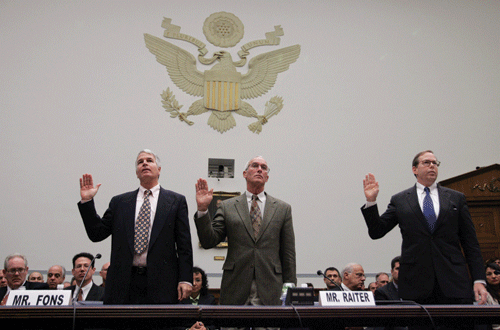The lure of an easy buck is tempting for many, and as online trading becomes ever more accessible in Lebanon there are many who are ready to put their savings on the table. As with everything that seems too good to be true, however, the pitfalls are plentiful and inexperienced traders will quickly find themselves prey to the sharks of the market.
The number of online brokerages in Lebanon has been steadily swelling in recent years, with four launched in 2011 alone. Banque du Liban (BDL), Lebanon’s central bank, has 13 registered financial brokers, of which nine have online services. Also offering online trading platforms are many of Lebanon’s other financial institutions, including the major banks.
What online brokers offer investors is easy access to the financial markets and the opportunity to trade a wide variety of securities from anywhere in the world, through a desktop, laptop or smartphone.
“Everyone can have access to the markets and trade all types of financial instruments for as low as $500,” says Walid Abousleiman, chairman of Aksys Capital, referring to the standard minimum deposit required to open an online account.
Mohammed al-Hamidi, managing director at AM Financials, says that for average Lebanese people without a large capital base to invest from, online trading can be a tempting way to make money.
Aiding the surge in online brokerage is the rapidly expanding access to Internet across the region. “When you look at the percentage of Internet penetration in various countries in the Middle East, all are on the rise and Lebanon is no exception,” says Karim Farra, chairman of Amana Capital. “The concept was proven elsewhere, with online brokers in the United States and in Europe flourishing, so there was less risk for online brokers in Lebanon as we are not reinventing the wheel.”
Size of the market
The foreign exchange market is the world’s largest, with an average daily turnover of $4 trillion as of April 2010, 20 percent higher than in 2007, according to a report by the Bank for International Settlements. The report reveals that the growth of foreign exchange trading is partly attributed to increased trading by retail investors, who account for $150 billion of the average daily trade total, or 4 percent of the forex market.
Taking into account the population of the Middle East and North Africa (MENA), its trading history and Internet penetration, as well as the lopsided market share of the US, United Kingdom and Japan, Farra estimates that just 1.25 percent of total global foreign exchange trades are carried out in the MENA, equating to $1.8 billion per day, or $470 billion per year.
“The potential for the MENA region is clearly there as we have to play catch up in market share to claim our rightful 5 percent share,” says Farra.
An interesting perspective put forth by Henri Chaoul, general manager of Master Capital Group, is that the significant amount of liquidity sitting idle in Lebanese banks has contributed to the increase in the number of online brokers. According to Chaoul, Lebanese banks hold between $20 billion and $25 billion of ‘risk capital’ — money investors are willing to play the markets with.
“Banks have been very slow to react and provide products for [the excess liquidity]; as a result, finance companies have mushroomed because they want to take that opportunity,” he says. However, Chaoul is concerned about the lack of development concerning the financial products offered: “You don’t get any degree of sophistication. For instance, there is hardly any asset management.”
Jamil Barrage, head of asset management at financial institution Levantum, agrees on the lack of sophistication in the market. He says he tries to offer clients long-term investment advice, but encounters many who prefer much shorter horizons.
“‘Should I buy gold? I want to make a quick buck’,” says Barrage, mimicking these clients. “Their mentality is geared towards instant gratification and trading and they want to win now.”
Every online broker Executive spoke to for this article said the vast majority of traders in Lebanon, and the wider MENA region, are speculators, looking to make a quick buck rather than invest for the long-term.
“They gamble and they like it,” says Chaoul. “The more you gamble, the bigger your bet is and the higher the risk that you lose. Think about the casino. When was the last time you went to the casino and made money?”
Online brokers note that the average retail investor lacks market experience and so tends to lose money, while experienced traders generate better returns as they perform in-depth analysis of the securities traded and have superior market awareness.
A leverage-powered casino
In Lebanon, clients are typically offered 1:100 leverage on forex, meaning that for every $1 deposited the client can trade up to $100. This significantly raises the risk of being wiped out quickly.
Say a trader wants to buy euros and sell dollars. He opens an account with $5,000 and his broker gives him 1:100 leverage, so he can trade up to $500,000. If the euro/dollar exchange rate stands at 1.36, he can buy €368,000; if it falls to 1.345, his €368,000 is now worth $495,000, meaning he has lost $5,000 — or his entire investment — for just a 1 percent change in the euro/dollar.
“If you take on too much leverage with a small account, you cannot hold positions, you are obliged to [exit],” says Marwan Riachi, senior financial consultant at Berytus Capital.
The US imposed rules last year to reduce leverage at US Forex brokers to 1:50 on major currency pairs and 1:20 on minor currency pairs. No such regulation exists in Lebanon and some online brokers offer leverage up to 1:400. According to Rayan el-Annan, chief executive officer of Royal Forex Trading, “stricter leverage rules, like in the US, would be very good in general to protect people from assuming more risk than they can handle.”
Given that clients are frequently wiped out, online brokers have to constantly be on the lookout for new ones. “Online brokerage is a very inefficient business model as you have to constantly get new customers,” says Chaoul. “If you are living in the US or Western Europe, there are plentiful amounts of clients. The problem here is that the number is limited.”
The darker side
Among the reasons for the rapid rise in online brokerage is that it has proven lucrative, but revenues do not stem from commissions alone.
It is a popularly cited statistic in the brokerage industry that 90 percent of retail investors lose their money; many online brokers in fact count on this to fatten their pockets.
The role of an online broker is to execute trades for clients in exchange for a commission. A widely understood practice in Lebanon, however, is for brokers to place their clients’ orders on their books and not send them to the exchange. These brokers are betting that the majority of their clients will lose their deposited capital, which is a form of market making prohibited by the BDL.
“What is happening in Lebanon is mind-boggling,” says Barrage, who describes an encounter he says he had with a salesman. “He asked us how many of our customers make money. When we said, ‘just a few’, he replied, ‘You see how much money you could have made if you had taken all these positions onto your books.’”
“It is the Wild Wild West,” he adds.
According to Chaoul, some online brokers will say “X is a stupid trader so we won’t send their trades to the market as we expect him to lose; so we will trade against him and hold the trade on our books.” In this case, when the trader loses money, the broker does not just take the commission on the trade, he takes the entire amount initially deposited by the client for the trade. The risk is that the trader makes money, in which case the broker will have to pay him from his own account. If they face a smart trader, then they will send the order to the market.
Rawad Halawi, head of Halawi Investment Trust — which focuses mainly on South Lebanon — says his firm faces competition from several unregulated online brokers, which offer very low commission fees.
“They must be winning something. They are relying on the loss of the client — that’s the source of their income so that’s why they can lower their commissions. They are killing the market,” he says.
Holding traders’ positions on their books is not the only shady business online brokers are up to. When a trader buys a contract of gold from his broker, that broker is meant to place that order with the appropriate exchange, which will require a margin from the broker as a buffer. For instance, the current margin required by the Chicago Mercantile Exchange for a contract of gold is $11,475, and that is a fixed amount required from any investor who wants to buy a contract of gold.
In Lebanon, some brokers are ignoring the margin requirements of the exchanges and asking for lower margins to induce the clients to buy. “If the exchange requires a margin of $6,000, they will give it to you for a margin of $1,000 and they will not send it to the market,” says Chaoul. “At best it is deceptive marketing, and at worst it is fraud, and it is happening all the time.”
What is not generally realized is that when a client buys a future contract on the popular platform MetaTrader4, which is used by the vast majority of brokers in Lebanon, the order goes to the broker and not directly to the exchange, meaning the broker is doing the execution.
According to Nusseima Taleb from BDL’s legal department, the central bank is aware of these issues and is trying to curb them: “We require reports from brokers and we monitor them onsite. If they are not abiding by the law, we take the necessary measures. If their breach is serious, we can close them down.”
When asked about plans for issuing a license for market making, she replied that “it is just talks for now,” and that there are no concrete plans to issue such licenses as yet.
Looking ahead
“Online brokerage in the Middle East is still in its infancy and it is going to grow tremendously,” says Hamidi.
The number of online brokers setting up shop is a reflection of the expectation of growth in this industry, and while the ease of access to the financial markets is a step in the right direction — allowing investors in Lebanon and the MENA to have the same investment opportunities available in other parts of the world — traders should tread with care to avoid pitfalls in the perilous world of online trading.
Sidebar: Picking an online broker
With the rise in the Middle East of brokerage firms dedicated to online trading, Executive helps you ask the right questions when choosing your online broker.
What service do you need?
Online brokers differ in the amount of services they provide. So to decide which type of service you need, think about how experienced you are as a trader. If you have significant experience, you can go for an execution only brokerage. If you are not experienced enough, you will need a full service broker who will offer investment recommendations. Keep in mind that these services are usually not offered to small accounts and when offered, they come at a fee, sometimes embedded in the commissions. It is highly recommended to take courses related to financial securities before starting to trade.
What securities do you want to trade?
Online brokers also differ in the amount of securities offered. Some brokers are specialized in particular securities while others offer several types. Deciding which ones to trade should be based on your understanding of the security and also on your risk appetite. For instance, trading future contracts is much riskier than trading equities. A typical future contract would provide you with a 1:100 leverage, meaning that if you open an account with $1,000, you can trade with up to $100,000. Equities, on the other hand, typically offer a 2:1 leverage.
What trading platform is offered?
Some brokers offer their own proprietary trading platform but most commonly they offer a third party platform such as MetaTrader4, JT Trader and CQG Trader. It is essential to become familiar with the platform before starting to trade. Most online brokers provide demo accounts so that you can practice before going live. Some also offer platforms for your smartphones and tablets — a feature worth taking into account if you expect to trade on the go.
What are the rates on different securities?
Online brokers charge different commissions for the various securities they offer. In most cases, these rates vary depending on the volume traded. You will need to ask what rate you will be charged based on the volume you expect to trade. Also make sure you ask about the “hidden” fees as some brokers might charge fees for closure of an account, an inactive account or the transfer of funds out of the account.
What is the minimum deposit required to trade?
When deciding to open an account, you need to ask what is the minimum deposit required. For trading of futures, in most cases there will be a margin requirement set by the exchange that online brokers abide by. For trading foreign exchange and equities, online brokers will usually require a minimum deposit to open an account; nowadays, this can be as low as $500.
Who are the correspondents?
Online brokers use correspondents, financial institutions that have access to markets and place trades on behalf of the brokers. Make sure to ask who the correspondents used are. The higher the rating of the correspondent, the more you can be assured that your money will not evaporate.
How good is their reputation?
Before deciding on an online broker, ask around. As there are still no professional reviews of online brokerages in the Middle East, you need to rely on word of mouth. Also try calling the customer service of the brokerage to check how quickly they respond, check if they have live chat and if their response is efficient and helpful. Visit the broker personally before you open an online account to make sure it feels right.
With the rise of Internet penetration throughout the Middle East and the ease of accessibility to trading financial instruments, online brokers have been mushrooming. Gaining an understanding of the various securities and making an informed decision on which online broker to choose is fundamental in order to reduce the risk of losing your investment.









